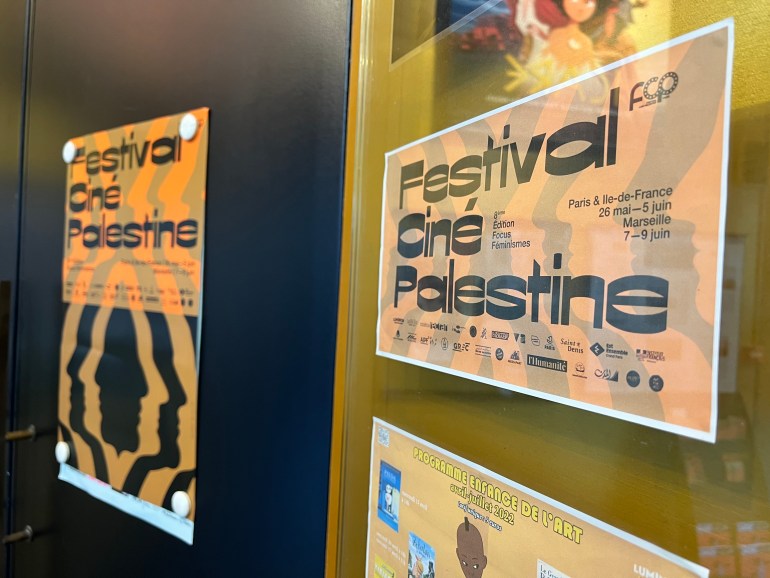The Palestine Film Festival has been able to prove its artistic presence in the cultural agenda of Paris since 2015, and it will look at the audience in its current version under the slogan "Feminists" from May 26 to June 9 in Paris and Marseille.
The festival is considered a Palestinian window to the West that transcends all geographical restrictions and borders, and an opportunity to introduce the quality of Palestinian cinema and highlight the work of Palestinian female directors in particular.
In different halls of Paris and Marseille, southern France, 14 feature-length and documentary films will be shown (Al-Jazeera)
cultural forum
In different halls of Paris and Marseille, southern France, 14 feature films (fiction and documentaries), 24 short films will be shown, as well as an outdoor evening in the suburbs of the French capital.
The festival is organizing a competition for short films for the sixth year in a row, which includes a variety of fiction, documentaries and animations, to promote cinematic creativity and support novice students in the field of cinema.
The Mentorship program also aims to support Palestinian female directors and directors to develop and write their own cinematic projects for short films.
Vida Al-Junaidi, a member of the festival's organizing committee, explained in an exclusive interview to Al-Jazeera Net that all the films shown were translated by the members of the committee, which includes a team of young volunteers.
"We are trying to preserve the independence of the organization in terms of themes and the selection of participating films without any external interference or pressure as much as possible," Vida added.
The festival deviates from its traditional context by hosting various events that witness the presence of the participating female directors to discuss direct with the audience, introduce more about their work and talk about the Palestinian cause.
The idea of the festival is based on emphasizing the value of the women’s struggle in Palestine (Al-Jazeera)
Women's struggle
The eighth edition of the festival aims to shed light on the works of female directors that highlight the role and resistance of Palestinian women in the face of the Israeli occupation and the challenge of male domination in the private and public spheres from the 1930s until today.
The festival opened its cinematic shows with a special tribute to the late colleague Sherine Abu Aqleh, who was assassinated on May 11 in Jenin by the occupation forces.
Vida Al-Junaidi says, "We were shocked by the news of the assassination of Abu Aqila, whose voice and message we grew up with. She was trying to portray the suffering of the Palestinian people as a journalist and as a Palestinian woman. With her death, the voice of freedom of expression and democracy was assassinated."
She pointed out that all members of the organizing committee denounce this crime, calling for the need to prosecute the perpetrators to achieve the justice "which Shirin, the Voice of Palestine, deserves."
The idea of the festival is also based on emphasizing the value of women's struggle in Palestine by talking about the difficulties that female directors face while doing their work.
Dima Hamdan, a Palestinian short film director residing in Berlin, revealed to Al Jazeera Net that the challenges that directors face in the diaspora are mainly in obtaining funding from European funding funds, the competition for which is most intense.
Dima added that the sensitivity of issues or topics that expose Israeli violations constitute an obstacle to the implementation of the cinematic work, even if it is presented in creative and indirect ways, and often leads to the refusal of funding the project.
The eighth edition of the festival aims to shed light on the work of female directors that highlight the role of Palestinian women (Al-Jazeera)
Honoring Ghassan Kanafani
The festival devoted cinematic screenings to films inspired by the writings of the prominent Palestinian novelist and politician Ghassan Kanafani, as well as other films about his private life.
The film "The Little Lantern" by Italian director Mario Rizzi is one of the most important films that express this honor.
The film tells the story of Kanafani's wife, the 85-year-old Danish woman, Annie Hofer, who moved in the sixties to Lebanon and married the love of her life.
Director Mario Rizzi tells Al Jazeera Net that after Kanafani's death, Ani sought to realize his dream of justice and work in the Palestinian camps by establishing places dedicated to teaching and caring for children.
He adds that "the documentary style and the fictional narrative alternate in this film, which was filmed in a kindergarten set up by Annie Kanafani in the Burj al-Barajneh camp, located near Beirut."
The film takes its title from a fictional story written by Ghassan Kanafani for his niece Lamis, which is a metaphorical account of the development of democracy and a depiction of a Palestinian spring that breaks the barriers of refugee camps and overcomes indifference through nonviolence and dialogue.

